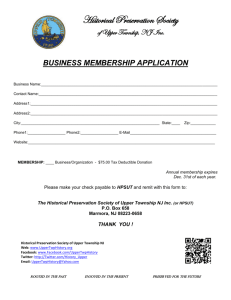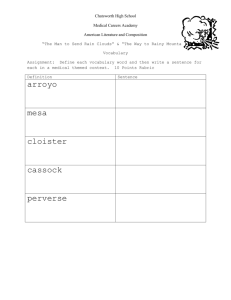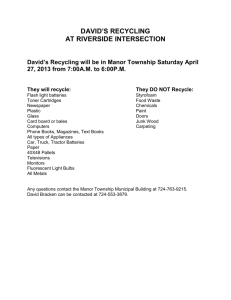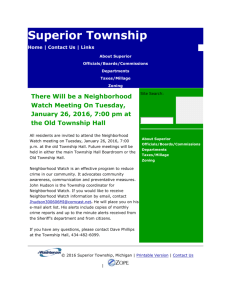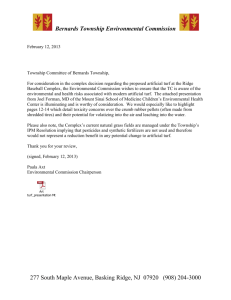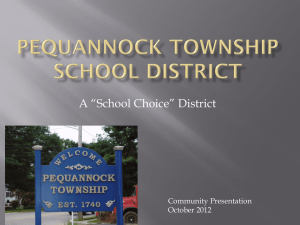CHATSWORTH TOWNSHIP LIBRARY BYLAWS TABLE OF
advertisement
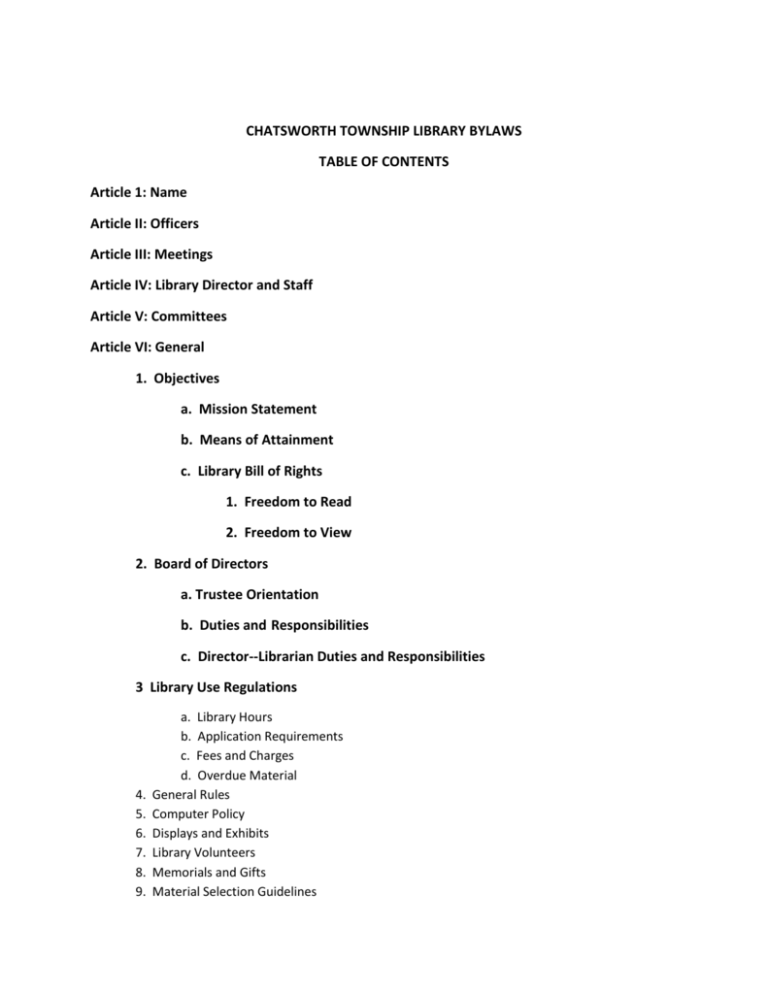
CHATSWORTH TOWNSHIP LIBRARY BYLAWS TABLE OF CONTENTS Article 1: Name Article II: Officers Article III: Meetings Article IV: Library Director and Staff Article V: Committees Article VI: General 1. Objectives a. Mission Statement b. Means of Attainment c. Library Bill of Rights 1. Freedom to Read 2. Freedom to View 2. Board of Directors a. Trustee Orientation b. Duties and Responsibilities c. Director--Librarian Duties and Responsibilities 3 Library Use Regulations 4. 5. 6. 7. 8. 9. a. Library Hours b. Application Requirements c. Fees and Charges d. Overdue Material General Rules Computer Policy Displays and Exhibits Library Volunteers Memorials and Gifts Material Selection Guidelines 10. Objection to Books 11. Appendixes 1, Means of attainment 2. Drug Free Workplace 3. Computer & Internet Use Agreement 4. Display Materials Release 5. 6. Request for Reconsideration of a Book CHATSWORTH TOWNSHIP LIBRARY POLICIES 1. Disaster Plan 2. Prevailing Wage ordinance 3. Weeding Policy 4. Five Year Plan 5. Technology Plan 6. Freedom of Information Policy 7. Investment Policy/Budget and Financial Policy 8. Bloodborne Pathogens Policy 9. Records Confidentiality Policy 10. Sexual Harassment Policy 11. ADA compliance policy 12. Conduct Policy 13. Investment of Public Funds Policy 14. Reference Policy 15. Ethics Policy 16. Gift Ban Policy CHATSWORTH TOWNSHIP LIBRARY BYLAWS Article I: Name The library shall be called the Chatsworth Township Library. The board of trustees of the library shall exercise the powers and authority and assume the responsibilities delegated to it by the statutes of the state of Illinois. Article II: Officers Section 1. The officers shall be a president, a vice-president, a treasurer, and a secretary elected from among the trustees at the first regular meeting of the board following an election. Section 2. Officers shall serve a term of one year ending on the 31st day of March or until their successors are duly elected by the board. Section 3. The president shall preside at all meetings of the board, authorize calls for any special meetings, appoint all committees, execute all documents authorized by the board, certify all bills approved by the board, and generally perform the duties of a presiding officer. Section 4. The vice-president shall perform the duties of the president in the event of the absence or disability of the president. Section 5. The secretary shall keep an accurate record of all meetings of the board, shall issue notice of all regular and special meetings, and shall perform such other duties as are generally associated with that office. Section 6. The treasurer shall maintain records of the library finances including all receipts, disbursements and balances in any funds. The treasurer shall sign checks on the library account on the authorization of the board. Each check must also bear the signature of a second trustee as designated by the board. Article III: Meetings Section 1. The regular meetings shall be held every month, the date, hour and place to be set by the board at its annual meeting. Section 2. The annual meeting, which shall be for the purpose of the election of officers and the adoption of an annual report, shall be held at the time of the regular meeting in April of each year. Section 3. The order of business for regular meetings shall include but not be limited to the following items: a. Roll call of members b. Disposition of minutes of the previous regular meeting and any intervening special meeting c. Treasurer's report d. Action of bills e. Report of the director f. Committee reports g. Communications h. Unfinished business i. New business j. Public presentation to, or discussion with the board k. Adjournment Section 4. Special meetings may be called by the president or the secretary, or by any four trustees, by written notice delivered the day immediately preceding the day of any special meeting, or by oral notice in the case of a stated emergency. Section 5. Proceedings of all meetings shall be governed by Robert's Rules of Order. Article IV: Library Director and Staff The Board shall appoint a qualified Director who shall be the administrative officer of the library on behalf of the Board and under its review and direction. The director shall implement the recommendations of the board in reference to the duties of other employees and shall be held responsible for the proper direction and supervision of the staff. The director will have the primary duty of informing the Board of any problems concerning the care and maintenance of library property, for an adequate selection of books, for the efficiency of library service to the public and for its financial operation within the limitations of the budgeted appropriation. In the case of part-time or temporary employees, the Director shall have interim authority to appoint without prior approval of the Board provided that any such appointment shall be reported to the Board at its next regular meeting. Article V: Committees Section 1. These shall be four standard committees appointed by the president. a. Budget and finance b. Policy, bylaws, and legislation c. Building and equipment d. Materials and programs Section 2. The president shall appoint special committees of one or more members each for such other purposes as the business of the board may require. The committee shall be considered to be discharged upon the completion of the purpose for which it was appointed and after the final report is made to the board. Section 3. All committees shall make a progress report to the library board at each of its meetings. Section 4. No committee shall have other than advisory powers unless, by suitable action of the Board, it is granted specific power to act. Article VI: General Section 1. The bylaws may be amended by the majority vote of all members of the board provided written notice of the proposed amendment shall have been mailed to all members at least ten days prior to the meeting at which such action is proposed to be taken. Section 2. Any rule or resolution of the board, whether contained in these bylaws or otherwise, may be suspended temporarily in connection with business at hand, but such suspension, to be valid, may be taken only at a meeting at which two-thirds of the members shall be present and two-thirds of those present shall so approve. I. Objectives A. Mission Statement The primary purpose of the Chatsworth Township Library is to provide a collection of popular materials in a variety of formats for persons of all ages. A special emphasis is to be placed on providing programs to preschoolers that encourage an interest in reading, to help support the formal education of students of all ages, and to inform the community of the various services available at the library. B. Means of Attainment See Appendix 1 C. Library Bill of Rights, Freedom to Read, Freedom to View We express approval of and acceptance of these principles as further stated in the Library Bill of Rights, the Freedom to Read Statement, and the Freedom to View Statement, as adopted by the Chatsworth Township Library Board of Directors. II. Library Bill of Rights (Adopted June 18, 1948. Amended February 2, 1961; June 27, 1967; and January 23, 1980, by the A COUNCIL) The American Library Association affirms that all libraries are forums for information and ideas, and that the following basic policies should guide their services. 1. Books and other library resources should be provided for the interest, information, and enlightenment of all people of the community the library serves. Materials should not be excluded because of the origin, background, or views of those contributing to their creation. 2. Libraries should provide materials and information presenting all points of view on current and historical issues. Materials should not be proscribed or removed because of partisan or doctrinal disapproval. 3. Libraries should challenge censorship in the fulfillment of their responsibility to provide information and enlightenment. 4. Libraries should cooperate with all persons and groups concerned with resisting abridgment of free expression and free access to ideas. 5. A person's right to use a library should not be denied or abridged because of origin, age, background, or views. 6. Libraries which make exhibit spaces and meeting rooms available to the public they serve should make such facilities available on an equitable basis, regardless of the beliefs or affiliations of individuals or groups requesting their use. III. Freedom to Read Statement (Based on the Freedom to Read Statement, adopted by the ALA Council June 25, 1953, revised January 28, 1972, by the ALA Council.) 1. It is in the public interest for the Board of Directors and Director (Librarian) to make available the widest diversity of views and expressions, including those which are unorthodox or unpopular with the majority. 2. The Board of Directors and Director (Librarian) do not need to endorse every idea or presentation contained in the books they make available. It would conflict with the public interest for them to establish their own political, moral or aesthetic views as the sole standard for determining what books should be published or circulated. 3. It is contrary to the public interest for the Board of Directors or Director (Librarian) to determine to acceptability of a books solely on the basis of personal history or political affiliations of the author. 4. The present laws dealing with obscenity should be vigorously enforced. Beyond that there is no place in our society for extra-legal efforts to coerce the taste of others, to confine adults to reading matter deemed suitable for adolescents, or to inhibit the efforts of writers to achieve artistic expression. 5. It is not in the public interest to force a reader to accept with any book the prejudgment of a label characterizing the book or author as subversive or dangerous. 6. It is the responsibility of the Board of Directors and the Librarian, as guardians of the people's freedom to read, to contest encroachments upon the community at large. 7. It is the responsibility of the Board of Directors and the Librarian to give full meaning to the freedom to read by providing books that enrich the quality of thought and expression. By the exercise of this affirmative responsibility, they can demonstrate that the answer to a bad book is a good one, the answer to a bad idea is a good one. IV. Freedom to View Statement (Adopted or endorsed by the Educational Film Library Association, 2/70; American Library Association's Intellectual Freedom Committee and the American Library Association Council, 6/70; Board of Directors of the Association of Educational Communications and Technology, 12/70) The Freedom to view, along with the freedom to speak, to hear, and to read, is protected by the First Amendment to the constitution of the United States. In a free society, there is no place for censorship of any medium of expression, Therefore, we affirm these principles: 1. It is in the public interest to provide the broadest possible access to films and other audiovisual materials because they have proven to be among the most effective means for the communication of ideas. 2. It is in the public interest to provide for our audiences, films and other audiovisual materials which represent a diversity of views and expression. Selection of work does not constitute or imply agreement with or approval of the content. 3. It is our professional responsibility to resist the constraint of labeling or prejudging a film on the basis of the moral, religious, or political beliefs or the producer or filmmaker or on the basis of controversial content. 4. It is our professional responsibility to contest vigorously, by all lawful means, every encroachment upon the public's freedom to view. V. Board of Directors-Director and Librarian Relationships A. Board of Directors-Trustee Orientation 1. Acquaint the new members with their duties and responsibilities. 2. General Orientation: A brief outline of the organization of a library at the local, system, state, and national levels should be presented. Trustees need to be aware that each of them has a talent to give to the library. Some examples are in the field of business management, in finance, personnel, public relations, as in public speaker, or in developing window displays or special programs. 3. Brief history of local library including the origin, the financial status, and the value of property, such as book collection, building site, etc. 4. Complete tour of the library. B. Board of Directors-Duties and Responsibilities 1. The Board is the legal policy making body. 2. The Board shall select and employ the Director-Librarian. 3. The Board shall encourage improved public relations and shall be concerned about interpreting the library program and its facilities to the community. 4. The Board shall lead the way in maintaining an ample budget which will enable the library to meet its needs for service. 5. The Board shall also be responsible for the administration of the budget. 6. Salary will be set as commensurate with the qualifications and local positions of similar nature and will be reviewed six months after hiring and that before the annual budget. 7. The Board shall be responsible for maintenance of library property. C. Director-Librarian-Duties and Responsibilities 1. The Director serves as chief executive of the library and is responsible for the administration of the library under policies approved by the Board. He/She is directly responsible to the Board and through the Board to the community. 2. The Director shall attend all regular meetings of the Board and is urged to speak on all subjects under discussion, but has no vote. 3. The Director shall, under the direction of the Board, select the staff and direct said staff in carrying out the activities and services of the library. 4. The Director is responsible for book selection and purchase, according to library policies. 5. Every instance of leave of absence shall be considered by the Board. 6. Library service hours are to be determined by the Board and posted in a conspicuous place by the Director. The director shall be responsible for the assignment of work schedules as best serve the needs of the community. 7. A probationary period of six months shall apply for Director and other employees and a Board review will be conducted at that time. VI. Library Use Regulations A. Library Hours 1. The library shall be closed to the public on New Year's Day, Memorial day, July 4th, Labor day, Thanksgiving and Christmas. 2. The library shall close at noon the day before Thanksgiving, before Christmas and before New Year's day. B. Application Requirements 1. Applicants for a library card must give name, address, telephone number, occupation, place of employment and verification of residence in Chatsworth Township. After verification of above information and processing, a permanent borrowing card may be granted as a Chatsworth Township resident. 2. Residents, age 18 or over, upon proper application shall be issued a library card which entitles him/her to use the facilities of the library and system. Library cards shall be valid for three years from the date of issuance, or until termination of residence, whichever period is shorter. New card holders ma check out only one book at a time for the first three months as a card holder. 3. Residents under 18 years of age, upon proper application with a co-signature of one parent or guardian over 18, shall be issued a library card which entitles him/her to use the facilities of the library and system. Terms of validity shall be the same as those for residents 18 years of age and older. Children who have not completed kindergarten will need to have their parent's or guardian's card to withdraw materials. 4. Any student, age 14 or older shall be given the privilege of using the adult section of the library. 5. Any family residing in an unserved library area, upon proper payment of the current fee, may be issued a Chatsworth township library card which entitles members of the family to use the facilities of only Chatsworth township Library. The fee amount for Chatsworth Township Library is calculated according to the state formula. Such cards shall be valid for one year. Any rules cited pertaining to residents, shall like-wise apply to non-residents. Non-residents who display current real estate tax receipts for property within Chatsworth Township may receive a resident's card at no cost. C. Fees and Charges 1. Non-resident card feel shall be calculated yearly according to the state formula which is: Library income from local property taxes______________ Service population (per latest official U.S. Census_______ Average household size (per latest official U.S. Census)_________ ***divide the library income from local property sources by the local population to determine the cost of service per capita...then multiply the per capita figure by the average number of persons per household in the community to obtain the average cost per household on which to base a fee for a family card. Libraries using this general mathematical formula may establish a non- resident fee higher than this amount, but may not charge less. 2. Overdue material A. One week over due will receive a phone call from the director as a reminder that material is overdue. B. After three weeks overdue a letter will be sent reminding the patron of the overdue materials and information relative to the cost of the materials not returned and the fact that library privileges are in jeopardy of being suspended. C. If no response is made to this letter, library privileges will be suspended until the borrowed materials are returned, fines paid or payment is received for replacement of the borrowed items. D. The fine for overdue periodicals or books is 5 cents per day that the library is open and $1 per day for video materials. 3. The charge for lost items is the price listed on the shelf life card or replacement cost. 4. Lost cards will be replaced upon request for a $1.00 fee. D. General Rules 1. All library material, except "Reference Only" may be borrowed for a period of two weeks. 2. Books on the reserve lists may be checked out for the two week period with no renewals. 3. All books reserved by a patron must be picked up at the library within two library days of notification. A patron who fails to pick up books in this time period will have his/her name added to the bottom of the list. 4. Materials may be renewed by telephone. 5. A patron should not loan library materials outside the household. 6. A patron may be asked to present his/her library card or identification for library records in order to borrow a book. 7. Patrons may not consume food or beverages in the library unless it is a library designated function. Smoking is never permitted in the library. E. Computer Policy 1. The director/librarian reserve the right to restrict access to the computers by an individual who does not adhere to these rules adopted by the Board of Trustees. 2. All computer users must have a valid Chatsworth Township Library card and must sign in before using the computers. 3. All patrons must read and sign an "Internet User Agreement". All children 17 years old and under must have guardian/parental permission and signatures on the "Internet User Agreement" to use the Internet. (Appendix 3) 4, Only two people will be allowed at a computer at one time. 5. Time at the computer will be limited to 30 minutes when someone is waiting. 6. Noisy users will be given one verbal warning before being asked to leave the computer area. 7. Users may not save data on the hard drives or alter the computer in any way. Users may not alter or attach equipment to the library's hardware. 8. Users should leave the computer settings as they were before use. All windows should be closed at the end of a session. 9. Internet use will be limited to rules as outlined by the Library Board's Internet policy. 10. Searches/"surfing" are limited to appropriate material or research material. No sites containing nudity, inappropriate language or pornographic materials will be allowed on library equipment. 11. No IM (instant messaging) may be used on library computers. 12. Any damage caused to the computer due to improper use will be charged to the responsible party. In the case of a minor, the parent or guardian will be held responsible. 13. This library receives funding that assists in providing Internet access. We are required by law to install filtering/blocking software on our computers. Filtering/blocking software is inherently imperfect. It inevitably blocks vast amounts of constitutionally protected material. At the same time, however, it is incapable of providing complete and reliable protection against obscenity, child pornography, and materials harmful to minors. Under the law, the Library can unblock websites that have been blocked and can disable the filtering. blocking for adult patrons (ages 17 and older) upon request, Requesting adults need not explain why they wish to disable the filter or unblock a particular website. VII. Displays and Exhibits A. It is the policy of the library not to advertise commercial endeavors unless the project is specifically related to the goals of the library, or a non-profit organization. No advertising of a political or controversial nature will be displayed. B. The library welcomes displays of general interest to the community as well as materials having a direct relationship to the purposes of the library. C. All permanent or semi-permanent exhibits offered for display may be used at the discretion of the director upon approval of the board. D. All materials displayed in the library will be given reasonable care and protection within the limits of the general operations of the library, but the library and Board do not assume responsibility for damage or loss suffered on its premises, nor for the costs if insurance coverage. Such costs, losses, damages, etc. are understood to be the responsibility of the organization or individual providing the display or exhibit. A signed statement of insurance coverage should be provided when the display is established; or, if it is uninsured, a statement releasing the library from any responsibility. (see Appendix 4) E. Place of exhibits must be mutually agreeable to both the Director and the exhibitor and should in no way interfere with normal operation of the library. VIII. Library Volunteers A. Library volunteers are engaged by the Director with Board approval. A volunteer works under the supervision of the director, doing tasks the director assigns. B. The hours of time for volunteer help will be mutually agreeable to the Director and the volunteer. IX. Memorials and Gifts A. The Library Board welcomes monetary gifts to be used for memorial presentation books or other materials. Any item purchased or received as a memorial or gift becomes the sole property of the library. The Board would prefer that these materials be compatible and enriching to the library collections. In order to accomplish this goal, the staff will suggest collection areas, appropriate titles, and/or use the monetary gifts which would be used to purchase items at library prices. B. The Library, with the permission of the local funeral home director, has placed envelopes designated for Library Memorials at the funeral home. C. The director will periodically release to the press a list of memorials and gifts, listing both the honored and the donor(s). The librarian will send a letter of acknowledgement for any gift or memorial to the donor and a letter to the donee's family informing them of the memorial. D. The disposition of an item is the responsibility of the Library Board and/or director. The board will use the item mindful of the concerns of the donor, but will always act in the best interest of the library over the concerns of any individual. When material becomes obsolete, an item becomes dated, or simply for reasons of space, any item in the library will be used or disposed of at the Board's discretion. We reserve the right to shelve and display, or not shelve and display, and book or item. X. Material Selection Guidelines A. The director/librarian shall endeavor to select materials which are of permanent and current value and represent the best available material to meet the needs and interests of all the people in the community. B. Materials purchased will meet high standards of quality in content, format, and expression. It shall include a wide range of materials on all levels of development with varieties of interest and points of view. All areas of knowledge shall try to be included in the total collection with an objective point of view. C. Materials that are obscene will not be selected for the library. However, no material shall be judged for exclusion by taking single passages out of context and basing condemnation of that material on such lifted passages. D. Due to the fact, it would be impossible for the director/librarian to read every book and view every film being considered for selection, agencies such as Alliance Library System shall be consulted and used for the purpose of determining the merit of materials not familiar to the Director and librarians. XI. Objection To Books A. Objections to books will be handled by the Director who will issue the "Request for Reconsideration of a Book" form to the complainant. Upon its completion and return to the Director, it will be referred to the Board for review. (see Appendix 6) Appendix I CHATSWORTH TOWNSHIP LIBRARY GOAL 1 To expand and maintain a collection of materials for people of all ages. To increase accessibility of a large amount of materials. OBJECTIVE To increase qualitative and current material for children, juveniles, young adults, and adults. To participate in the development of the library's collection. To provide continued evaluation and expansion of materials and programming as well as continued acquisition of supporting programs. ACTIVITIES A. Examine and review reference material to aid in the selection of appropriate materials including computer usage. B. Order the materials to be added to the collection. C. Weed collection as needed. D. Compile an accurate updated inventory--stored off site. E. Assess our collection according to acceptable standards. F. Assess and evaluate programs with cooperating libraries. EVALUATION A. Evaluation will be by number of print and non-print materials added, withdrawn and circulated. B. Computer usage per capita. C. Review inventory and disaster plan on an annual basis, D. Turn-over rate. E. Reference questions per capita. F. Document delivery. GOAL 2 To provide programs for preschoolers and lower elementary children that encourage an interest in reading. To help support the formal education of students of all ages. OBJECTIVES To increase the amount of preschool and lower elementary supplementary material in an effort to further support the programs presented. To continue providing supplemental materials for classroom/individual use in cooperation with the local school. ACTIVITIES A. To plan a program using material and activities that have been selected as to accuracy, suitability, and effectiveness for the given age levels. B. To conduct story time and other related activities. c. To expand children's reading material experiences. D. Presenting educators with the materials available through local and system library via workshops, lists, etc. EVALUATION A. Statistics on the number of children attending story time. B. Statistics will be kept on number of children's items added, withdrawn, or circulated. C. Tracking in library and system materials used for formal education purposes. GOAL 3 To inform the community of the various services available through the library. OBJECTIVE To increase awareness and usage of the varied services provided by the library. ACTIVITIES A. To provide informational programs about library services for local organizations and groups. B. Increase usage of publicity techniques in newspapers, radio and television. C. Formulate a brochure listing library services. EVALUATION A. Statistics will be kept on number of programs and attendance. B. Statistics will be kept on circulation and on circulation per capita. C. Registration as a percent of population. D. Library visits per capita. MEANS OF ATTAINMENT In maintaining these objectives the following policies should be observed by Board and staff: a high degree of accuracy in records maintained, and information given, cooperation with civic organizations, an open minded attitude toward new methods and improvements for better service, a high degree of attractiveness attained through neatness, order, systematic and imaginative arrangement, and a careful observation of ethics in relations between Board members and staff. Appendix 2 Resolution Pursuant to Drug-Free Workplace Act, 1988 The Chatsworth Township Library Board of Trustees, in order to comply with the provisions set forth by the Drug-Free Workplace Act of 1988, hereby sets forth the following policies, effective the date of passage of this resolution. 1. The unlawful manufacture, distribution, dispensing, possession or use of a controlled substance is prohibited in the workplace of the Chatsworth Township Library. 2. Any violation of the above prohibition by an employee of Chatsworth Township Library will result in disciplinary action against the employee, up to and including discharge. 3. The Drug-Free Workplace Act of 1988 requires that as a condition of employment with the Chatsworth Township Library all employees will a. abide by the terms of this resolution, and b. notify the Director of any criminal drug statute conviction for a violation occurring in the workplace no later than five days after such conviction. 4. Chatsworth Township Library may require an employee who violates these provisions to participate satisfactorily in an approved drug abuse assistance or rehabilitation program. 5. Any eligible employee who has a substance abuse problem may utilize the Alcohol and Substance Abuse Program available through the medical insurance program provided by the employee. This Resolution will be Appendix 1 to the Chatsworth Township Library Personnel Policies. A copy of this resolution will be posted in the Chatsworth Township Library and made available to all current and future employees of the Chatsworth Township Library. Passed: July 9, 1992 A patron who violates the terms of this policy may be expelled for the library at the discretion of the director/librarian. Use privileges may be suspended for a specified period of time. The Library may, in its discretion, refer incidents to appropriate legal authority for prosecution when this policy is violated. Sanctions against patrons shall be in accordance with library regulations and procedures. The library shall obtain and make available materials from local, system, state and national anti-drug and alcohol abuse organizations and, where appropriate, enlist the aid of community and state organizations with drug and alcohol information and rehabilitation programs to provide information to the Library patrons and employees. Appendix 3 Computer and Internet Use Agreement Welcome to the Chatsworth Township Library public access computer policy pages. Computer use shall be consistent with the Chatsworth Township Library's mission to provide a collection of popular materials in a variety of formats for persons of all ages with a special emphasis placed on providing programs that encourage an interest in learning and supporting the formal education of students of all ages and to inform the community of the services available at the library. Computer use will be managed in a manner consistent with the library's rules of conduct. Not all computer resources/sources provide accurate, complete or correct information. Users need to be good information consumers, questioning the validity of the information. If you need assistance, please ask. To maximize availability, and to insure fair accessibility to all, please follow these rules and procedures. A complete list of the rules is placed by each computer work station. 1. All users required to read and sign this Computer and Internet Use Agreement. 2. You must have a current library card and be in good standing (all materials are turned in and all fines are paid). 3. Computers are available during all regular library hours. Access is for thirty minutes, unless no one is waiting to access a computer. 4. Computer use is on a first come first served basis. 5. All patrons must sign in before logging on to a computer. 6. No more than two people at the computer workstation at a time. Excessive noise or creating a disturbance will warrant a one- time verbal warning and computer privileges will be restricted. 7. You may not use your own software in the Library computers. This includes musical compact disc, portable electronic devices such as thumb drives, mp3 players, cellular phones, and PDA's (personal digital assistants). 8. You may print for a charge of 25 cents per page. DO NOT ATTEMPT TO PRINT WITHOUT FIRST CHECKING WITH THE LIBRARIAN OR THE DIRECTOR. You are responsible for everything that you print. 9. Misuse of the computer will result in the loss of all computer privileges. 10. Library staff can usually help with basic computer use. 11. If you have difficulty in using the computer or the internet check with the director or librarian before attempting anything that of which you are uncertain. 12. Do NOT change any settings under any circumstances. Only the director can change settings. This is designed as a safety net for all computer patrons. All prospective users will sign a Computer and Internet Use Agreement. Those 17 years of age and younger will be required to have a parent or guardian's permission to use the computer. While the Library will make efforts to ensure that the use of the Internet is consistent with the mission statement, parents are encouraged to work closely with their children in selecting material that is consistent with personal and family values and boundaries. Minors may not access inappropriate matter on the Internet and World Wide Web. Inappropriate matter for minors is that which is obscene, child pornography, or harmful to minors which is defined as visual depictions of inappropriate matter as defined above. Computer users, particularly minors, should not reveal any personal identifying information (such as name, address, telephone number, email address, social security number, age, or credit card number) about themselves of others The Library utilizes filtering technology as a protection measure, Websites may be "unblocked" after library personnel make a reasonable determination that the site does not contain obscenity, child pornography, or harmful to minors material. Any attempts to gain access to restricted computer files or hacking to damage of modify computer software or equipment is prohibited and will result in suspension of privileges. The Library will treat information stored on computers as confidential (whether or not that information is protected by the computer operating system.) Request for disclosure of information will be honored only under one of the following conditions: 1. When approved by the Board of Directors 2. When authorized by the owners of the information 3. When required by local, state or federal law Except when inappropriate, computer users will receive prior notice of such disclosures. Viewing the information in the course of normal system maintenance does not constitute disclosure. WARNING: Use of electronic mail in its present form cannot be deemed 100 percent secure and therefore is extremely vulnerable to unauthorized access and modification. Ultimate responsibility for resolution of problems related to the invasion of the user's privacy or loss of data rests with the user. Chatsworth Township Library assumes no liability for loss or damage to the user's data or for any damage or injury arising from invasion of the user's privacy. All reasonable efforts will be made in ensure computer equipment is in good working order. SANCTIONS: Violators of computing use policies my lose TOTAL library privileges. Staff will be subject to normal disciplinary procedures as well. Violations of the policies described above for legal and ethical use of computing resources will be dealt with in a serious and appropriate manner, Illegal acts involving library computing resources may be subject to prosecution by local, state, or federal authorities. DISCLAIMER: Since the Internet is a global electronic network, there is presently no state/county control of its users or content. The Internet and its available resources may contain material of a controversial nature. Parents/Guardian of minor children must assume responsibility for their children's use of Internet through the Chatsworth Township Library connection. Library staff cannot control the availability of information links which change rapidly and unpredictably. Not all sources of the Internet provide accurate, complete information. If you need assistance, please ask. All patrons who wish to use the Chatsworth Township Library computer equipment are required to sign and date the following "Limitation of Liability". The undersigned acknowledges that he/she has read and understands the Computer and Internet Usage Agreement. The undersigned further acknowledges and agrees that Chatsworth Township Library assumes no liability for any loss or damage or injury arising from invasion of privacy in the user's computer accounts, programs, or files. ________________________________________________ Patron's signature ________________________________________________ Parent/Guardian Signature __________________________ Date _________________________ Date Appendix 4 DISPLAY MATERIALS RELEASE All materials displayed in the library will be given reasonable care and protection within the limits of the general operations of the library, but ht library and Library Board do not assume responsibility for damage or loss suffered on its premises, nor for the costs of insurance coverage. Such costs, losses, damages, etc. are understood to be the responsibility of the organization or individual providing the display or exhibit. I have read the above and release the Chatsworth Township Library from any responsibility beyond reasonable care and protection. Date_____________________________ Signature___________________________________________________ Address______________________________________________________ Appendix 6 REQUEST FOR RECONSIDERATION OF A BOOK DATE____________________________ AUTHOR_________________________________________ TITLE_______________________________________________________________________ PUBLISHER_________________________________________________________ REQUEST INITIATED BY__________________________________________________ ADDRESS_____________________________________________PHONE_____________________ COMPLAINANT REPRESENTS: HIM/HERSELF____________________________ GROUP/ORGANIZATION______________________________________________ 1. Why do you object to this book? 2. Did you read the entire book?______________If not, what parts did you read? 3. What do you feel might be the result of reading this book? 4. For what age group would you recommend this book? 5. Is there anything good about this book? 6. What do you believe to be the theme of this book? 7. To what specifically in the book do you object? 8. Are you aware of the judgment of this book by professional critics? 9. What reviews of this book have you seen? 10. What would you like your library to do about this book? Signature of Complainant____________________________________________________
